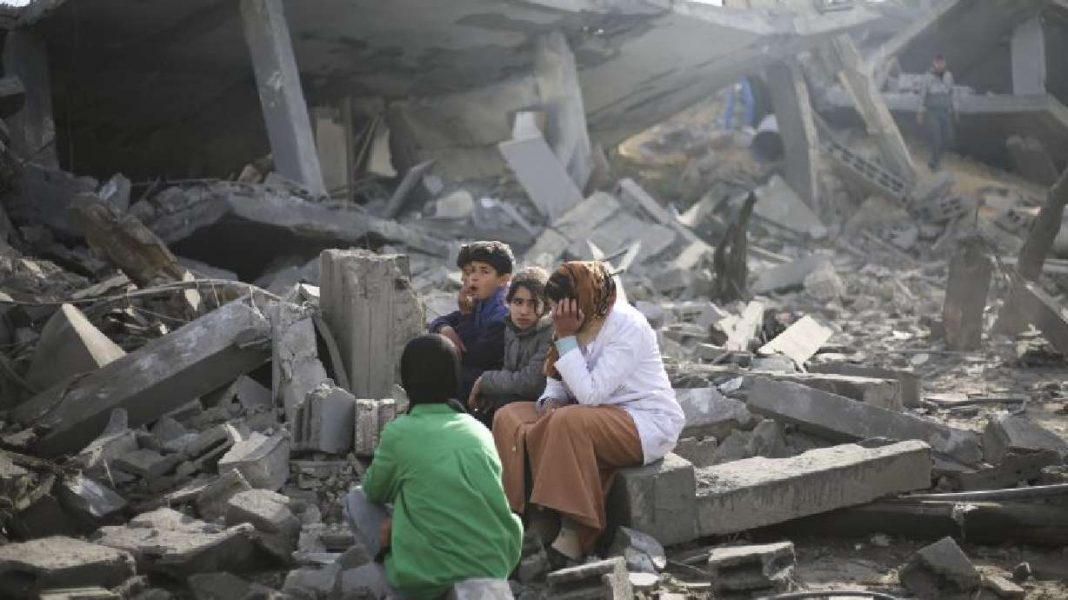CAIRO — Progress is being made in the negotiations between Israel and Hamas towards a cease-fire and hostage-release agreement, according to officials on Tuesday. This comes amidst Israel’s threats to extend its offensive to the southern borders of Gaza, where approximately 1.4 million Palestinians have taken refuge.
Negotiations continued in Egypt following a rescue operation by Israeli forces in Rafah, a densely populated town along the Egyptian border. The operation, which resulted in the death of at least 74 Palestinians and caused significant destruction, provided a glimpse into what a full-scale ground advance might entail.
A cease-fire agreement would provide much-needed relief to the people of Gaza, who have been suffering from the ongoing war for five months. It would also secure the release of some of the estimated 100 hostages still held captive in Gaza. Qatar, the United States, and Egypt have been working to broker a deal, despite the starkly different public positions of Israel and Hamas.
Israel’s primary objectives in the war are to dismantle Hamas’ governing and military capabilities and to free the hostages. The war was initiated after a violent rampage by Hamas-led militants through southern Israel on Oct. 7, which resulted in the death of 1,200 people, mostly civilians, and the capture of approximately 250 people. The rampage led to the displacement of tens of thousands of Israelis from their destroyed communities.
The war has caused unprecedented destruction in the Gaza Strip, with over 28,000 people killed, more than 70% of whom were women and children, according to local health officials. Israel’s offensive has flattened vast areas of the territory, displaced around 80% of the population, and pushed more than a quarter of the population towards starvation due to a humanitarian catastrophe.
In related news, South Africa, which has accused Israel of genocide at the International Court of Justice, filed an “urgent request” on Tuesday for the court to consider whether Israel’s military operations in Rafah violate provisional orders issued by the justices last month. These orders called for Israel to take greater measures to protect civilians.
Israel has vehemently denied the genocide allegations and maintains that its operations are in compliance with international law. It blames Hamas for the high death toll, arguing that the militants operate in densely populated areas.
Israeli Prime Minister Benjamin Netanyahu has pledged to continue the fight until “total victory” is achieved and believes that military pressure will aid in freeing the hostages. However, only two hostages have been rescued by the military since the war began.
Other Israeli officials believe that only a deal can secure the release of a large number of hostages. Over 100 were released in exchange for 240 Palestinians imprisoned by Israel during a week-long truce last year. Three hostages were mistakenly killed by Israeli forces in December, and one female Israeli soldier was rescued in the early weeks of the war. Israeli officials report that around 30 hostages captured on Oct. 7 have died, either during the initial attack or while in captivity.
A senior Egyptian official reported “relatively significant” progress in the negotiations ahead of a meeting in Cairo on Tuesday, which included representatives from Qatar, the U.S., and Israel. The meeting aimed to draft a six-week cease-fire deal, with assurances that negotiations towards a permanent cease-fire would continue.
Key figures in the Cairo talks included CIA chief William Burns and David Barnea, head of Israel’s Mossad spy agency, both of whom played a crucial role in brokering the previous cease-fire.
‘There are gaps that remain’
A Western diplomat in Cairo confirmed that a six-week deal was being discussed, but warned that more work is needed to reach an agreement. The diplomat emphasized the importance of Tuesday’s meeting in bridging the remaining gaps.
Both officials requested anonymity due to the sensitive nature of the talks.
While the exact details of the proposed deal were not disclosed, it is known that the parties have been discussing various proposals for several weeks. Israel has proposed a two-month cease-fire, during which hostages would be released in exchange for the release of Palestinians imprisoned by Israel, and top Hamas leaders in Gaza would be allowed to relocate to other countries.
Hamas, however, rejected these terms. It proposed a three-phase plan of 45 days each, during which hostages would be released in stages, Israel would free hundreds of imprisoned Palestinians, including senior militants, and the war would gradually end, with Israel withdrawing its troops. This proposal was rejected by Israel, which aims to topple Hamas before ending the war.
Despite this, U.S. President Joe Biden indicated on Monday that a deal might be within reach. “The key elements of the deal are on the table,” Biden said, adding, “There are gaps that remain.” He pledged that the U.S. would do “everything possible” to facilitate an agreement.
Despite these signs of progress, the fighting continues. While concerns are growing over Rafah due to the large number of Palestinians seeking refuge there, fighting continues throughout the Gaza Strip.
The Israeli military reported ongoing battles with militants in Gaza’s second-largest city, Khan Younis, and in central Gaza. On Tuesday, it announced that three soldiers were killed in combat, bringing the death toll among troops since the Gaza ground operation began in late October to 232.
The Health Ministry in Hamas-run Gaza reported that the bodies of 133 people killed in Israeli strikes were brought to hospitals over the past day. This brings the death toll in Gaza to 28,473 since the war began on Oct. 7, according to the ministry, which also reports that more than 68,000 people have been wounded.




Great progress in diplomatic negotiations. Hoping for a peaceful resolution.